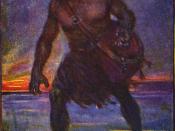The first part of this essay refers to the Novel "Grendel" by John Gardner, the latter delves into Nihilism in the real world, and then combines the two. For those that don't know, Grendel was the monster in Beowolf.
One of the most prominent themes in the novel Grendel by John Gardner is whether or not virtues such as faith, love, truth, and justice, actually exist, or if they are simply illusions. Baby Grendel; that is, Grendel before he becomes jaded and hardened by his experiences with men and the dragon, believes in these virtues. On the other hand the dragon, who is portrayed as possessing infinite wisdom to the extent that he can see the future, rejects this argument. He believes that men contrive these principles; they do not exist, they are simply false human conventions. His is a philosophy of nihilism. I believe that for the most part, the above feelings and principles do exist in men; they are inherent.
Life, both in and outside of Gardner's novel, provides many examples of this.
When Grendel begins in the world, he is fully aware of his darker side, however, there is another, softer side to Grendel. A side that embraces the "false conventions of men." Throughout the book, this side of him argues with his other cold and logical side. When the shaper plays his songs, though Grendel knows the words to be mostly false, he is filled with awe and wonder. This joy, which ironically is agonizing for the monster, is real; Grendel does feel it. Later when he attacks the meadhall in his plan to abduct Wealthow, he suddenly stops, experiencing a feeling that he can't describe- love. He sees Wealthow's beauty and her goodness, and he realizes that he loves her. While...


